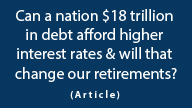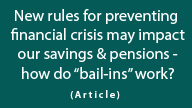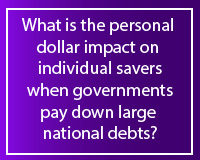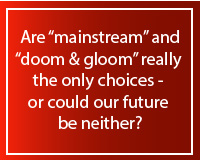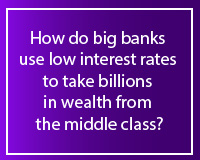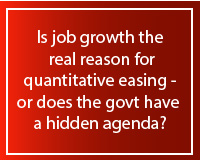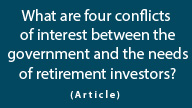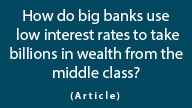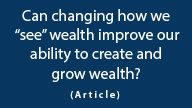Financial Contagions Spread Global Investment Dysfunction
By Daniel R. Amerman, CFA
Below is the 2nd half of this article, and it begins where the 1st half which is carried on other websites left off. If you would prefer to read (or link) the article in single page form, the private one page version for subscribers can be found here:
Falling Values & Climbing Prices
This fundamental deterioration is not necessarily reflected in share prices and other asset prices, however. Quite the reverse in some cases, for the money pouring in needs to go somewhere, and that may be into investment assets. Thus stock markets may climb. Companies may be purchased at healthy premiums. Farmland and rental properties may climb in price.
The local single family housing market may in some cases start to see rapid growth in prices, creating new homeowner wealth around the nation. Housing starts may jump and construction jobs grow, partially or even entirely offsetting the fundamentals-based job decrease in other areas (at least for a time). Again, for perhaps a few years or more, the flood of foreign money can create a surprisingly pleasant situation for many residents, with the appearance of prosperity.
Rapidly rising asset prices may create their own weather system, drawing in hot money from around the world and feeding the firestorm, as rising currency values and rising asset markets work together to create double-barreled profits for foreign investors. Asset bubbles are created, potentially in multiple markets, as fundamental economic health is replaced by the easy money of a speculative boom.
The discrepancy grows ever greater between the fundamental economic health of the nation, and the prices paid for the assets of the nation. This sets up a potentially catastrophic bubble collapse at some point, with the particulars of the collapse potentially being driven by foreign investors, and outside of the control of the citizens of the formerly healthy nation.
In an attempt to slow down the inflow of foreign money, avert asset bubbles and/or protect domestic jobs, the nation is likely to take defensive measures. New Zealand is choosing direct central bank currency interventions, a traditional method that can be expensive and not nearly as powerful as some of the currency warfare tools being deployed by other nations today. According to Frederic Neumann of HSBC in Hong Kong (per the New York Times), "South Korea, Hong Kong, Taiwan, Singapore, Malaysia - all have tried to restrict lending because of the rapid inflow of cash."
Australia and Thailand have chosen the more fundamental method of artificially lowering interest rates in order to make their nations less attractive for foreign investors, and thereby reduce both currency values and the rate of capital inflow.
When a nation like Australia repeatedly lowers interest rates as a currency defense, we have a full spread of the contagion from the sick source nations to the new host nations. Lower fundamentals for economic growth, combined with artificially high asset price levels (meaning lower future price appreciation potential), along with artificially low interest rate levels, along with deliberate attempts to lower the purchasing power of the currency - all work in combination to staunch the inflow of foreign funds, by creating a mirror of the toxic environment that the foreign investors are fleeing from.
Which means that ultimately there may be a transmission of the toxic investment environment, so that local investors in Australia and other nations face the same wealth-crippling challenges faced by their counterparts in the major economic powers which are the source of the contagion.
This then predictably leads to a transmission of political dysfunction into financial results all around the world, whereby the primary determinants of long-term investment results for local investors in Sydney, Perth and Bangkok may have more to do with economic situations and political considerations in Washington and Tokyo than with the local economy or political decisions, as politics trumps Modern Portfolio Theory.
Investor Implications
Globalization was sold to voters around the world with some key simplifying assumptions. (Whether these were entirely innocent oversights, or whether there was at least a component of some quite deliberate plans on the part of influential players to profit from the redistribution of wealth, is a question I will leave to the reader.)
The core issue is that like so much of modern economics and financial theory, globalization isn't so much based on human history as it is on simplifying assumptions about human behavior. Specifically, it is assumed that nations will behave in a highly rational manner that is driven by the free markets and that they won't "cheat".
Of course real human history demonstrates that many nations cheat for competitive advantage pretty much every time they think they can get away with it, and you could say that is the subtext to most financial headlines about the globe today.
The way you cheat with globalization is to use politics to twist your financial system for economic advantage, and take advantage of the cost /currency value loophole. Over most of the last 15 years, the Chinese have been the masters of this, manipulating the value of their currency to keep it artificially low, and enjoying the highest sustained growth rate that any major nation has ever seen as the direct result. Until the defensive measures started being taken.
Now all the major powers are going after the value of their currencies while cheating long-term domestic investors in the process, which then spreads the contagion throughout the world.
The simplifying assumption, the naïve theory that was used to sell globalization, is that market forces would rule, and the benefits would go to whatever nation produced the best goods and services at the cheapest prices. Thereby forcing other nations to make their own economies better and more efficient in response, as wealth increased around the entire world.
However, financial competition in terms of politics setting up financial systems for competitive advantage is the exact opposite.
What has emerged around the world is that direct monetization on a massive scale is used by a nation to attack its own currency and try to induce inflation. This is done in combination with artificial controls on interest rates to take money both from savers and investors, in order to be able to afford the massive debt levels, as well as to compete with other nations. So for a saver or investor, the way that your nation is likely competing with others right now is to try to cheat you out of market returns, which of course then results in a redistribution of wealth within your own society.
This creates a highly ironic position for investors around the world. Modern Portfolio Theory and its derivatives in areas like conventional financial planning and retirement planning are theoretically based on a market economy.
The reality is that in a competitive contagion that is continuing to grow around the world, politics is superceding market systems, and as a direct result thereof, retirees and investors around the world find themselves unable to enjoy the benefits upon which their financial plans are built. That is, decades of financial planning have been rendered obsolete because of political changes, but political changes are not allowed for in the financial models, and people are not prepared to respond to them.
This creates a thoroughly dysfunctional system, in which the only chance an investor has is to understand what is actually happening.
 What you have just read is an "eye-opener" about just one of the ways in which a rapidly shifting world is removing the foundations beneath conventional investing - even while most investors continue to follow the traditional strategies, unware of just how much the financial playing field has changed.
What you have just read is an "eye-opener" about just one of the ways in which a rapidly shifting world is removing the foundations beneath conventional investing - even while most investors continue to follow the traditional strategies, unware of just how much the financial playing field has changed.
 A personal retirement "eye-opener" linked here shows how the government's actions to reduce interest payments on the national debt can reduce retirement investment wealth accumulation by 95% over thirty years, and how the government is reducing standards of living for those already retired by almost 50%.
A personal retirement "eye-opener" linked here shows how the government's actions to reduce interest payments on the national debt can reduce retirement investment wealth accumulation by 95% over thirty years, and how the government is reducing standards of living for those already retired by almost 50%.
 An "eye-opener" tutorial of a quite different kind is linked here, and it shows how governments use inflation and the tax code to take wealth from unknowing precious metals investors, so that the higher inflation goes, and the higher precious metals prices climb - the more of the investor's net worth ends up with the government.
An "eye-opener" tutorial of a quite different kind is linked here, and it shows how governments use inflation and the tax code to take wealth from unknowing precious metals investors, so that the higher inflation goes, and the higher precious metals prices climb - the more of the investor's net worth ends up with the government.
 Another "eye-opener" tutorial is linked here, and it shows how governments can use the 1-2 combination of their control over both interest rates and inflation to take wealth from unsuspecting private savers in order to pay down massive public debts.
Another "eye-opener" tutorial is linked here, and it shows how governments can use the 1-2 combination of their control over both interest rates and inflation to take wealth from unsuspecting private savers in order to pay down massive public debts.







If you find these "eye-openers" to be interesting and useful, there is an entire free book of them available here, including many that are only in the book. The advantage to the book is that the tutorials can build on each other, so that in combination we can find ways of defending ourselves, and even learn how to position ourselves to benefit from the hidden redistributions of wealth.


